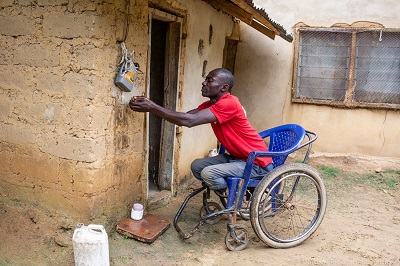
Beatrice lives in Accra, and cares for her son who has cerebral palsy. “This coronavirus and the lockdown that followed was a very stressful period,” she says, “because I can’t observe the social distancing measures since my son depend on me for everything. As a family, we have to make sure we wash our hands or sanitise them using hand sanitiser, as well as put on a face mask before approaching him.”
Beatrice’s experience is one shared by many people with disabilities and their families throughout Ghana. The COVID-19 pandemic and its associated public restrictions have made life particularly challenging for people with disabilities. This is not only because of physical distancing measures but also lack of access to information and health care. Different impairment groups face different barriers. For example, people who are blind require verbal information on how to wash their hands correctly, whereas people with intellectual disabilities require information in Easy Read formats with pictures explaining the measures they must take to stay safe. Thanks to the government of Ghana for ensuring sign language for the updates on COVID-19.
Each person with disability experiences their own barriers, and people with the same impairment type, may have different accessibility requirements. It is erroneous to assume that every visually impaired person will necessarily be a braille user. There are different accessible formats for people with visual impairment including screen readers and large prints.
Ghana recorded the first two positive cases of COVID-19 on 12 March 2020 and the government’s response was prompt and decisive. In the President’s address to the nation on 15 March, 2020 he announced several measures aimed at slowing the spread of the virus.These interventions touched on two main areas: health and prevention measures; and social interventions, meant to support populations most at risk. But it soon became apparent that information on the prevention of COVID-19 did not consider the specific requirements of people with disabilities, including people with mental health conditions.
Social interventions to support the people most at risk also did not consider the barriers that people with disabilities would face when asked to access food and other protective items compared to people without disabilities. In such situations it is critical to work with people with disabilities and their representations to inform the reasonable accommodation requirements needed.
According to the report, “Building a more equal Ghana,” Ghana’s key health indicators have improved steadily over the years, however large inequalities in health persist with significant disparities between income groups and regions, and people with disabilities, especially in rural areas, are the worse for it. To ensure that Ghana’s efforts to fight COVID-19 leaves no one behind, it is essential that all interventions are inclusive of people with disabilities including those with mental health conditions.
Critical questions that need to be asked include whether our health care facilities, including treatment centres for COVID-19, are accessible, and whether relevant information is available in accessible formats. People with disabilities and their representatives need to be part of the consultations, planning, design, and implementation of all development programmes to ensure no one is left behind.
According to the Executive Director of the Ghana Federation of Disability Organisations (GFD), “Most persons with disabilities in Ghana live in poor and deplorable conditions and are not able to acquire personal protective materials to protect themselves from COIVD-19.” People with disabilities are therefore at higher risk of getting infected by COVID-19.
There is a real need for targeted interventions, to end people with disabilities can access the support they need during the pandemic. Through Ghana Somubi Dwumadie (Ghana Participation Programme), funded by UK Aid from the British people, Sightsavers and our partners are ensuring the availability of accessible information about COVID-19 and raising awareness of people with disabilities, including mental health conditions, about the protective measures needed to combat COVID-19, and where to access care and support
We continue to call on the government to ensure that all other interventions are inclusive of people with disabilities, and that people with disabilities and their organisations are meaningfully consulted in deciding and implementing measures that are aimed at supporting them during the COVID-19 pandemic.
By Grace Antwi-Atsu
The Writer is Global Advocacy Advisor for West African Regional Office (WARO) Lead Person on Sightsavers’ AU engagement
On behalf of Ghana Somubi Dwumadie



